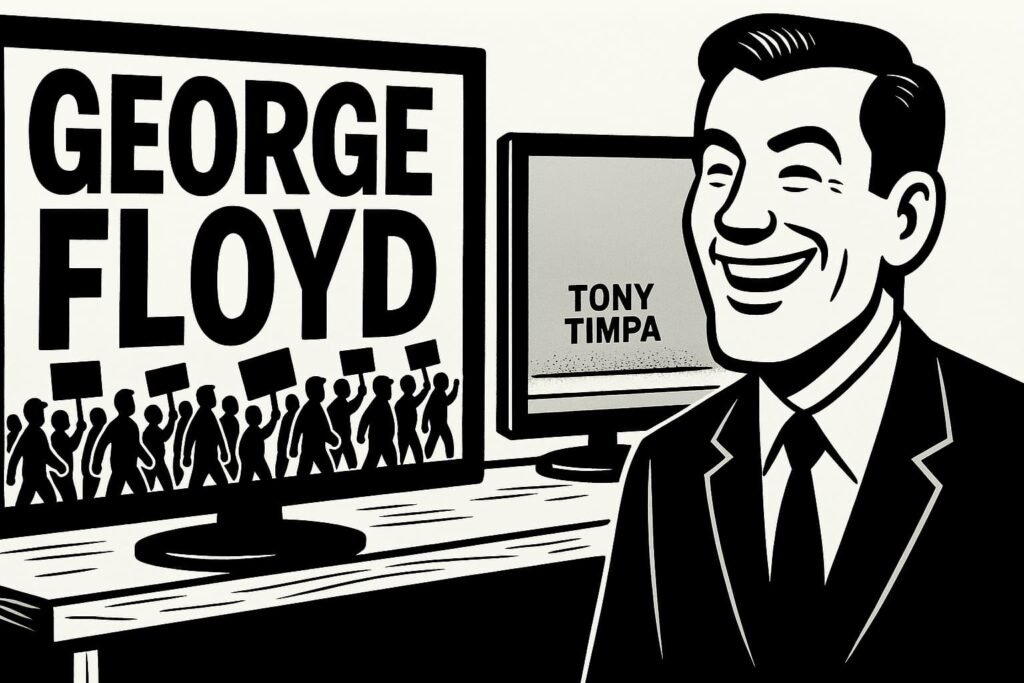George Floyd vs Tony Timpa – Selective Outrage Explained
Two men die in almost identical ways. One sparks a global movement. The other barely makes the news. Welcome to the politics of outrage.
When George Floyd was killed under the knee of a police officer in 2020, protests erupted worldwide. His name became a rallying cry for Black Lives Matter and the biggest wave of activism in a generation.
When Tony Timpa died in 2016, restrained by Dallas police officers as he begged for his life, the response was silence. No marches. No hashtags. Barely a headline.
The contrast tells us less about the tragedies themselves — and more about the world that consumes them.
Table of contents
What Is Selective Outrage?
Selective outrage is when society, media, and politics amplify some injustices while ignoring others. It’s not about the facts of a case — it’s about whether the tragedy fits the narrative.
- George Floyd → became the symbol of systemic racism.
- Tony Timpa → didn’t fit the script, so his case slipped away.
It’s not just about justice. It’s about which stories can be used.
How It Shows Up in Practice
- Media coverage → Floyd’s death dominated global headlines. Timpa’s was buried for years.
- Protests → Floyd sparked marches across continents. Timpa sparked none.
- Justice → Floyd’s killer was convicted. Timpa’s case was dropped quietly.
- Activism → BLM turned Floyd into a movement symbol. Timpa was left without one.
The same kind of death. Two completely different legacies.
Who Benefits?
- Activists → Floyd’s story fuelled BLM’s rise, proving the power of narrative. (See also: [BLM Explained]).
- Media → outrage sells. Floyd’s death delivered a global spectacle.
- Politicians → easy moral theatre: condemn Floyd’s killing, promise reform, cash in on symbolism.
Meanwhile, people like Timpa remind us that justice isn’t blind — it’s curated.
The Consequences
Selective outrage reshapes trust:
- Public cynicism → many conclude that justice depends on optics, not fairness.
- Polarisation → when tragedies are filtered by race or narrative fit, outrage itself becomes political currency.
- Erosion of universality → the idea that “all lives are equal” is undermined by unequal reactions.
The endgame? Justice by headline, not by principle.
Conclusion
The deaths of George Floyd and Tony Timpa reveal the brutal truth of modern politics: it’s not the tragedy that matters, but how well it can be packaged.
One man becomes the face of a movement. The other becomes a forgotten footnote. And justice becomes a performance — distributed according to narrative value, not human worth.
FAQ
What is selective outrage?
It’s when media and society amplify some tragedies while downplaying others, based on narrative fit rather than justice.
Why was George Floyd’s case different from Tony Timpa’s?
Floyd’s death aligned with systemic racism narratives, fuelling activism. Timpa’s didn’t, so it was largely ignored.
Did both involve police misconduct?
Yes — both men died while restrained by officers. Only Floyd’s case triggered global consequences.
Who benefits from selective outrage?
Activists, media, and politicians benefit by turning some tragedies into symbols — while ignoring others.
What’s the danger of selective outrage?
It undermines trust in justice by suggesting that attention, outrage, and accountability depend on identity politics.



